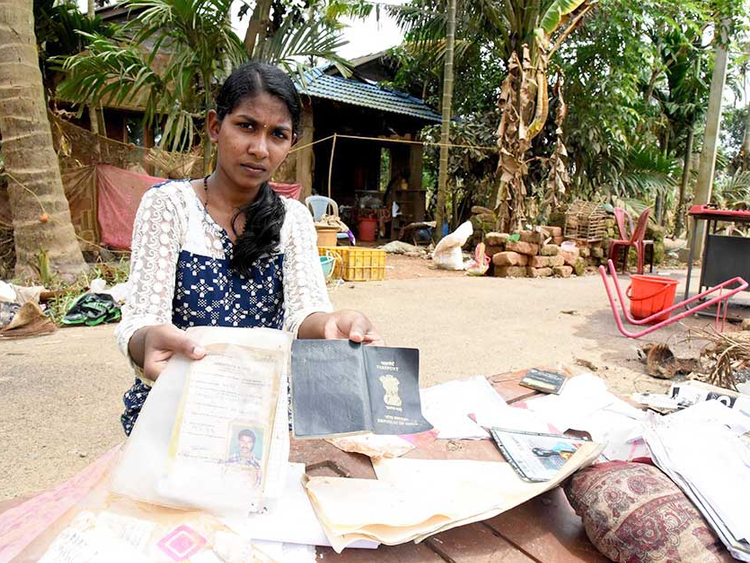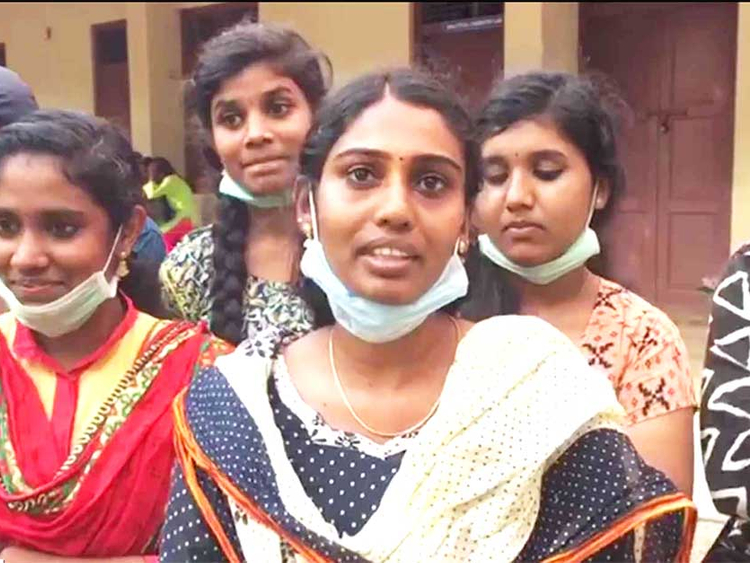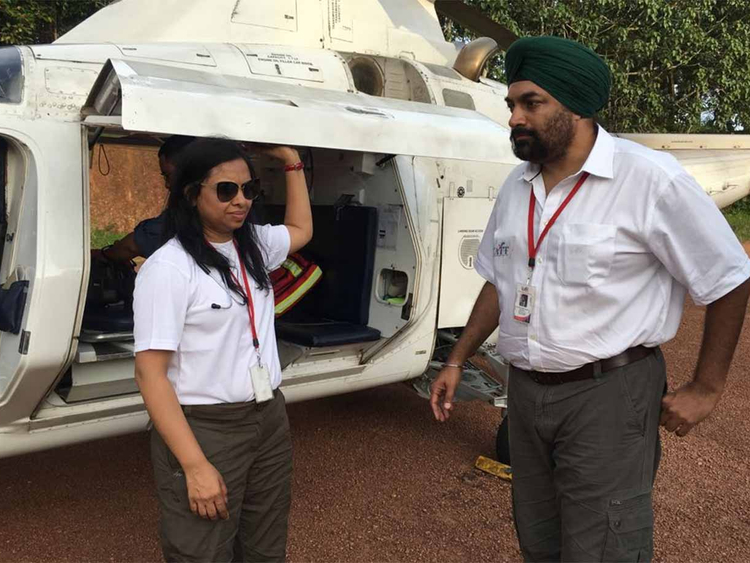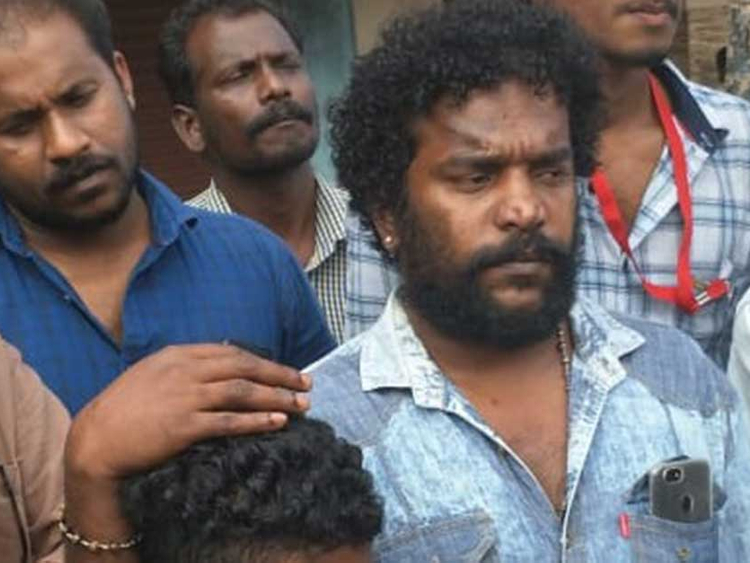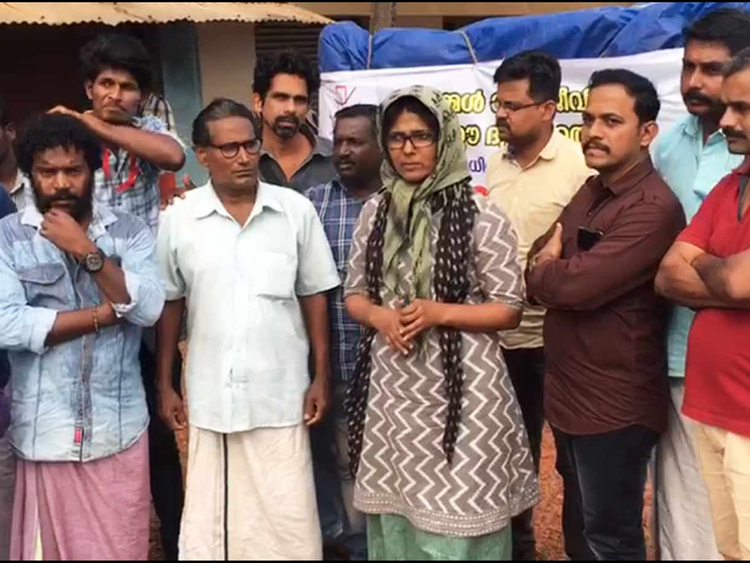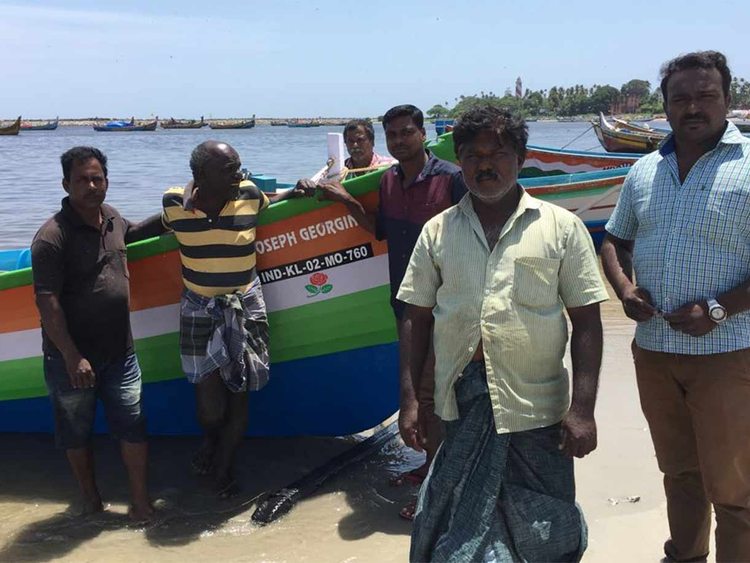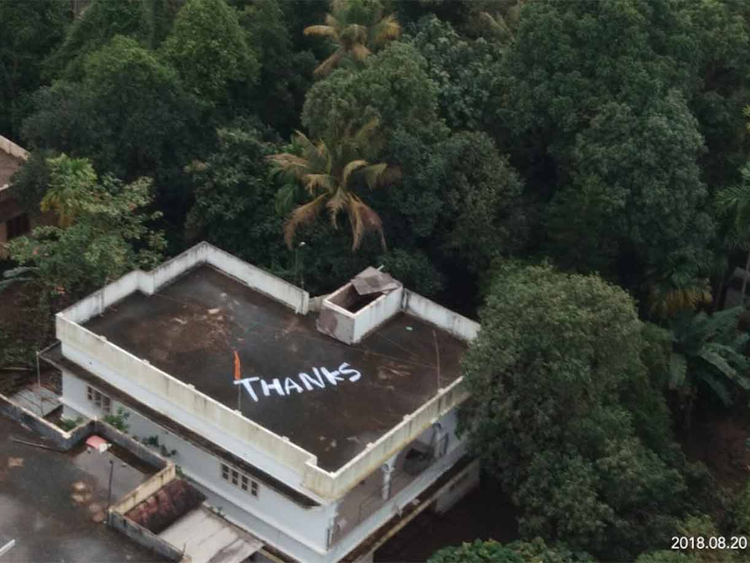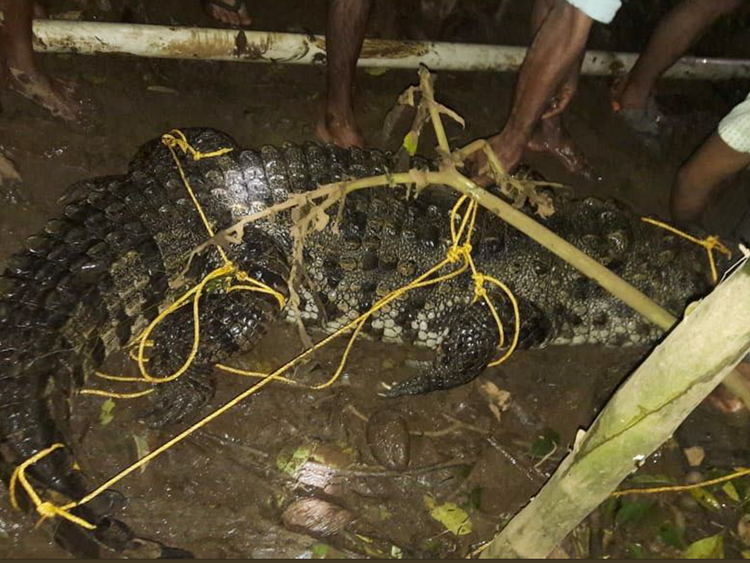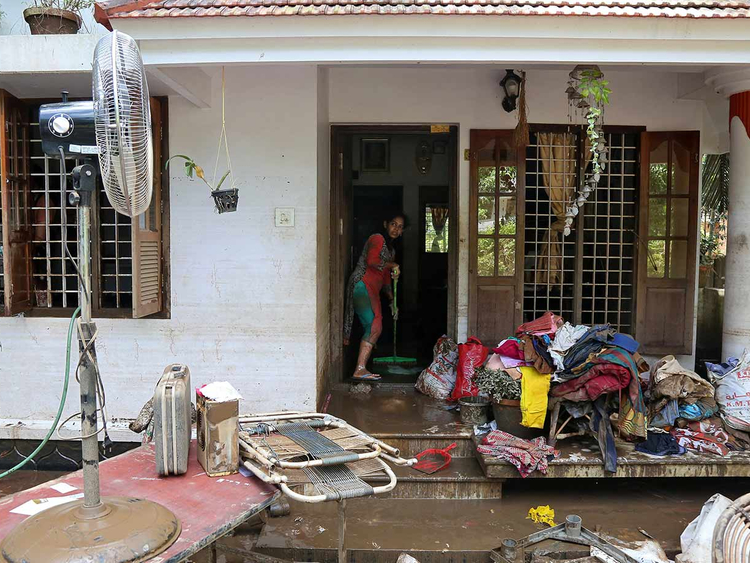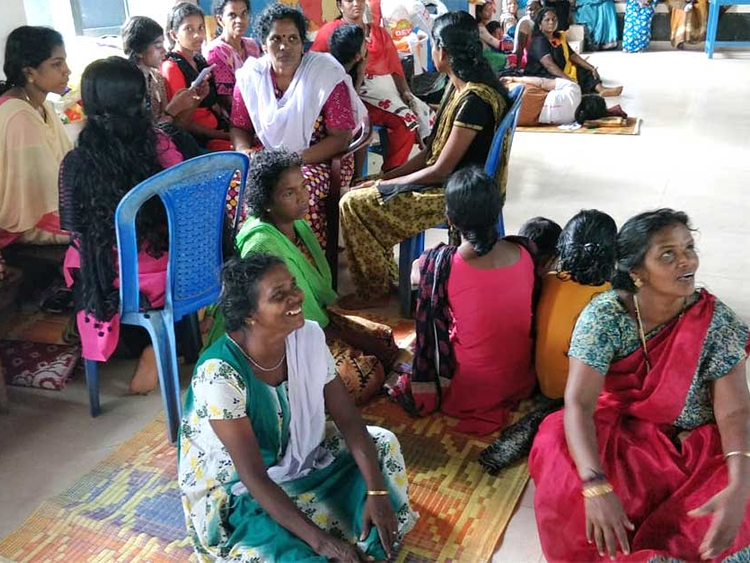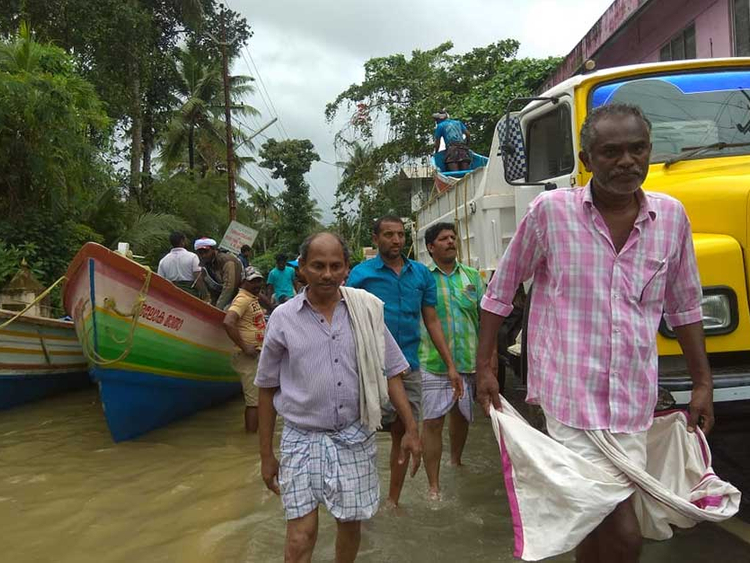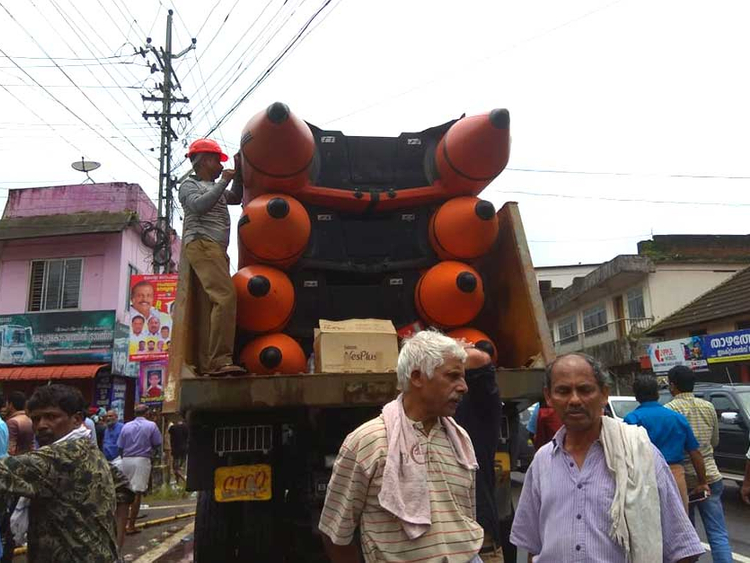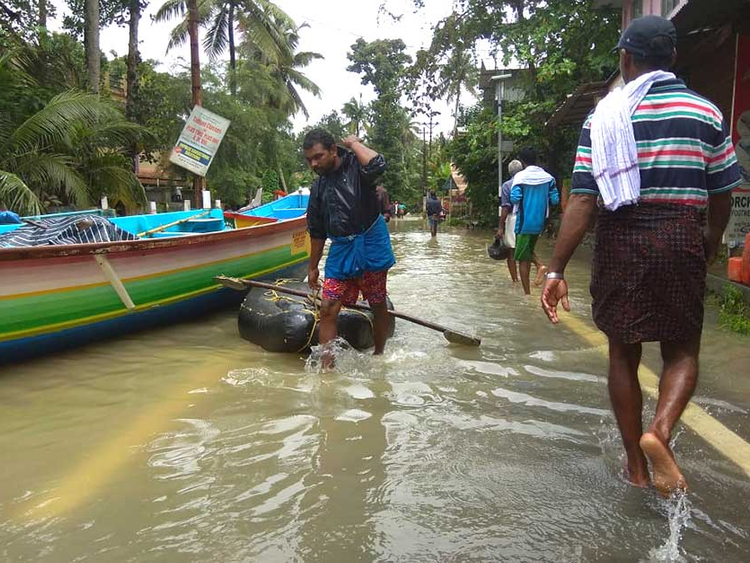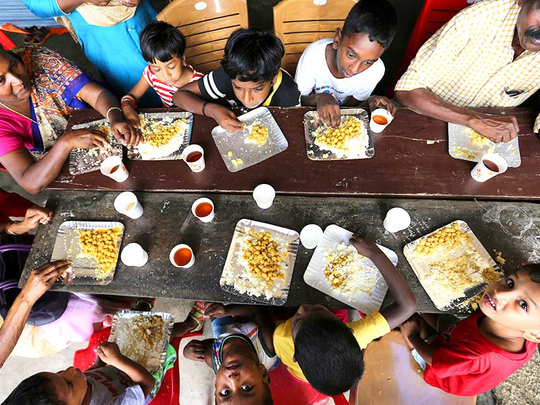
With floodwaters receding, Kerala’s fight against the deadly deluge continues as it emerges that the damage is extensive and relief camps are swamped with victims. Outbreak of skin diseases, including chicken pox, has been reported in some camps. With a significant part of the population, roughly a million, moved to about 3,200 relief camps, the state has extended all the machinery to cater to the massive demand at hand for relief and rehabilitation operations. There are fears about the spread of diseases and infections in relief camps.
Follow our updates from Kerala here:
Living in the company of the dead in Kerala village
Alappuzha: As flood waters rose to engulf their homes at Kainakary, a picturesque village in Alappuzha district, at least 20 families took refuge in a church cemetery and are living in the company of the dead with their domestic animals.
Thankachan and his family refused to accept help and go to a safer place leaving behind their cows and goats. However, as the water rose to a dangerous level, the family took shelter in the St Mary's church cemetery at Kainakary village, a taluk in Kuttanad, with the animals.
Kainakary is a sought-after spot by television serial makers due to its scenic beauty.
"We are not scared of living in the cemetery in the company of the dead. This is the final resting place of my father, elder sister and many other relatives who are buried here," Thankachan said.
"We had cows and goats and we did not want to leave them behind," he added.
Presently, there are 20 other families who have taken shelter at the graveyard.
They cook meals with whatever they are able to lay hands on, including fish. Water is a problem though and the stranded people have to depend on bottled water from Alappuzha.
Five rivers originating from the Western Ghats, including the sacred Pamba river, drain into the Vembanad lake at the tip of Kainakary, famous for its snake boat race rowers.
— PTI
Celebrities come forward to help
Celebrities from the Indian film and music industries such as Rana Daggubati, Abhishek Bachchan, Nandita Das, Javed Akhtar and Hariharan, came together to support the telethon, which raised Rs102 million for flood-hit Kerala.
Some others who lent support were Raveena Tandon, Manisha Koirala, Resul Pookutty, Jimmy Shergill, Aanand L. Rai, Sonakshi Sinha, Mudassar Aziz, Shruti Haasan, Ustad Amjad Ali Khan, Amaan Ali Bangash and Ayaan Ali Bangash.
Singers Ankur Tewari, Shaan, Tochi Raina, Kanika Kapoor, Shilpa Rao, Purbayan Chatterjee, Jasbir Jassi and Indian Idol" participants Nitin Kumar and Renu Nagar also sang and played during the six-hour telethon aimed at helping in rebuilding flooded villages and damaged and destroyed homes in Kerala, read a statement.
The telethon on Sunday had specific goals - to enable the rebuilding of villages in the three worst-affected districts and provide immediate assistance in terms of rehabilitation and food kits to people in the worst affected areas. All donations received will be directed to NGO Plan India.
Also lending support were Union Ministers Nitin Gadkari and K.J. Alphons; Rajiv Kumar and Amitabh Kant from Niti Ayog; Chief Ministers Pinarayi Vijayan, Conrad Sangma, N Biren Singh, Raman Singh, Naveen Patnaik and Devendra Fadnavis; as well as Thomas Isaac, Khushbu Sundar, Priya Dutt, Aditya Thackeray and Shashi Tharoor.
Telethon: Why Kerala needs your support
New Delhi: Kerala has been hit by the worst floods in a 100 years. The Kerala Government estimates Rs21,000 crore (about $3 billion, or Dh11 billion) will be needed to rebuild the state.
Funds are required to rebuild hundreds of flooded villages, thousands of damaged and destroyed homes and 10,000 kilometres of ravaged roads.
To help Kerala as it struggles to rebuild after the devastating floods, Indian TV channel NDTV -Tata Sky launched a special telethon to raise funds for Kerala. So far, the telethon has raised Rs10.2 crores, or Rs102 million.
3 worst-affected districts
The goal of the intiative, say organisers, is to enable the rebuilding of villages in the three worst-affected districts and provide immediate assistance in terms of rehabilitation and food kits to people in the worst affected areas .
All donations received will go directly to its registered NGO partner, Plan India.
"In partnering with Tata Sky, our focus will be on coverage that makes a difference, stories with a heart, standing by people and making their experience a shared one to effect change," organisers stated.
NDTV chose to report on this massive crisis with unwavering focus and commitment; having done that, now we look, as NDTV always does, to go beyond the news and make a difference to people’s lives," it added.
The funds donated will be disbursed by Plan India starting with Food Kits worth Rs2,000 that contain essential, locally-produced food items to ensure families do not go hungry when they return to their homes, NDTV said.
Fears of spread of diseases
Fears about the spread of diseases and infections from the disaster loom large, and K.K. Shailaja, Kerala’s Minister of Health and Social Justice, has her hands full doing the rounds of relief camps.
State officials are doing all they can to ensure availability of doctors, and have also involved the private health sector.
Shialaja, a sitting lawmaker from the Kuthuparamba assembly constituency in Kannur district, has urged the central government to "rethink" its refusal to accept aid from UAE, arguing Kerala needs all the help it can get as the state suffered damages worth billions and it is a huge disaster.
A little help from UAE friends
#KeralaFloods: Emirates SkyCargo will carry flood relief cargo of over 175 tons to Thiruvananthapuram in more than a dozen flights. It'll transport the relief goods donated by various UAE-based businesses and organisations, including lifesaving boats, blankets and dry food items pic.twitter.com/XiEDChVxsO
— ANI (@ANI) August 25, 2018
Back-to-Home kits for returning survivors
A week after the monster flood that killed hundreds hit Kerala, about 40 per cent of the relief camps are closed now.
Cleaning up and sanitation works are progressing on war footing in many affected areas and more survivors will go home in the coming days. The state government has announced plans and financial assistance for the survivors.
For their immediate requirement, the authorities are providing those returning home with a support kit. The kit contains rice and other essential items, some household utensils and sanitary materials for cleaning the house and the premises.
“We started this camp at Chunakkara Government UP School from August 17. 327 people from 126 families are staying here. We are packing things for those who can safely go home now,” said, Rajamma, social worker one of the key persons behind the camp.
"Those who cannot return now will remain in the camp with the full support. But some people can go now as their houses are now habitable. They have lost everything in their house, so we are proving them with some essentials goods including rice and garments,” said Rajamma.
Hospitals are readying anti-venom and flood victims returning home in the Indian state of Kerala have been told to stay alert as receding waters leave behind a glut of snakes.
Local media reports warned that snakes may be "hiding in cupboards" or under carpets, among clothes or inside washing machines in homes previously submerged by floods that have devastated parts of the southern state.
"Snakes are spotted at many flood-hit homes and alerts have been issued to exercise caution when returning home," Kerala government spokesman Subhash T.V told AFP on Friday.
"Hospitals too have been equipped to face the situation. Instructions have been given to arrange facilities to treat snakebite victims. "Anti-venom and other necessary medicines are stored at all hospitals, especially those in flood-hit areas," he added.
Local media said several hospitals in the worst-hit areas of northern and central Kerala had reported an increase in the number of patients seeking treatment for snake bites. State authorities and wildlife experts have formed teams to come to the aid of those who have found snakes in their home, according to local media.
The PTI news agency said the government had roped in a local snake expert, who advised returning residents to use a stick to sift through their belongings and not to touch household appliances with bare hands. (Agencies)
Kerala students show the way with selfless service
The role of youth in rescuing and now in rehabilitating the people whose lives are devastated by the deluge, has been much hailed. Among them are students who are working round the clock for the flood survivors.
Since most of the camps are functioning at schools and colleges, the students as well and the alumni of the educational institutions have voluntarily stepped in for the assistance of the people.
Once the shifting of people from the houses to relief was over, the focus of the students was to ensure food and other materials in the camp.
Apart from collecting money, buying materials, they had been working at the collection centres as volunteer workers. Even the relief operations are slowing down now as people have started leaving many camps for their homes once the water has receded. The students are playing a vital role here too. They have volunteered for cleaning and sanitation of the flood hit homes so that the survivors can safely resume their lives.
We me this energetic group in the camp run at Chengannur Christian College
Air Ambulance helps emergency patients
The first air ambulance facility in India was provided by the Bangalore-based International Critical Care Air Transfer Team (ICATT). Led by Dr. Rahul Singh Sardar and Dr. Shalini Nalwad, ICATT has been active in relief operations in Kerala.
We were interviewing the coordinator regarding their activities at the Chengannur Christian College ground. The talks were interrupted by a live situation when a patient was brought in an ambulance for airlifting for emergency treatment.
Flood survivor Thankamma, who was staying in Angadikkal relief camp, needed an emergency surgery within half an hour. She was flown to Medical College, Thiruvananthapuram immediately.
Doctors belonging to National Rural Health Mission (NRHM) and doctors in Chengannur help the ICATT in its missions.
Actor Manikandan brushes aside praises and focuses on helping the needy
Acclaimed Malayalam film and theatre actor Manikandan has been doing relief work for the last one week along with his friends and colleagues following the flood devastation.
He has thrown open his house in Ernakulam for relief work, says his friend.
But the 'Kammattippadam' actor brushes aside these praises and says he doesn’t think what he does is something extraordinary or out of the way.
“I am not considering this as a big ‘charity’ thing. I am not doing this as a film or theatre actor either. This is just my duty,” says the man in all humility and honesty.
“And not just my duty,” he adds. “It is the responsibility of all human beings. What makes me happy is that we are able to do this much at least,” Manikandan said.
“It was very difficult to find this place in Cheriyanad, because it is so isolated. It is not very easy to get outside help for those in the camp here. Four relief camps have been set up here,” the actor told Gulf News.
“I have been to camps in Ernakulam, Cherthala, Paravoor, Thammanam, etc., and from what I have seen, I think people here are facing a worse situation. So let us continue helping them. We should not consider the tragedy is over just because the sun is out for two days. We have decided to stay out of our homes until all these people have gone to their homes,” Manikandan said.
Artist group in relief operations
Everyone who has any connection to Kerala is doing relief work for the flood affected. Artists and activists belonging to Network of Theatre Artists and Activists Kerala (NATAK) is also at the forefront of flood relief operations by distributing food materials to various rescue shelters throughout the state.
NATAK volunteers collect food and materials from areas least affected by the flood and distribute among the most needy. They also say they do not dump materials indiscriminately at relief camps without checking the needs of the inmates there. NATAK team regularly visits camps they support and collect details of the things needed there and deliver goods accordingly. The state-wide operation by the organisation is being coordinated by NATAK general secretary Shailaja J.
Fishermen, the 'Supermen' of Kerala
There is a new meme going around in Kerala these days. ‘If the westerners have Superman, Spider man, Batman and other super heroes, we Keralites have Fishermen’ it says. And most Keralites will agree that it is not an exaggeration but a reality in the post-flood era.
After 45 days of annual monsoon trawling ban in Kerala, the state’s fishermen were getting ready to go out into the sea for the season’s big catch. It was then the disaster struck the state in the form of unprecedented flood.
Water from the heavens and the floodgates of the states 30 odd dams submerged district after district and the state’s official rescue network soon realized they are looking in the face of an intimidating task, even with the help of Indian army.
Because an entire state – and India’s most densely populated one – was held under siege by raging flood waters.
It was then fishermen from the coastal areas, or ‘Kerala’s own army’ as the chief minister would fondly call them later, emerged on the scene, without any official invitation or request.
Fishermen groups and associations voluntarily arranged their men and boats to be sent by trucks to affected areas, particularly the worst affected zones in Pathanathitta, Chengannur and Alappuzha.
And they made the decisive impact.
The men and their boats braved the fierce waters and crisscrossed sunken alleys and treacherous zones eagerly looking for lives to be saved. Water is their second home and these difficulties are nothing new to them.
Like everywhere fishermen are one of the fittest community in the entire Kerala and they are the toughest too, mentally. This helped them come out on top in the rescue challenge.
They saved many bedridden patients, old people, infants and many more with sheer will power and physical strength. When they came across areas were their boats cannot access, they didn’t hesitate to jump into the water and rescue hundreds. A number of their boats got damaged during the operations.
Once their mission was over, they returned silently back to the shores where they came from, without making a fuss or any tall claim.
We met some of these fishermen who took part in the operations, in Kollam, on the beaches of Vadi Jonakappuram and Thaankasseri. They were mending their fishing nets and repairing boats and getting ready to go fishing. If the government pays money to repair their damaged boats, great. If they don’t, no problem.
They don’t like to boast about their roles in the rescue operations – it was just looking after another fellow human being in trouble. They have denied the financial reward the state government had announced for them. They know one cannot measure lives with money.
“On the first day, we went with five boats. One of them hit against a barrier and broke into two,” says John (above) from Kollam.
“We had planned to come back on the same day. Even our neighbours had warned us that we won’t be able to pull it off. It was difficult to control the boats in the flood currents. We crashed many times but held on to the posts and restarted the engines. In the first mission itself we managed to save 35 people. By that time we had gained an idea about the currents in the area and were better equipped to navigate the flood waters,” he said.
“We were seeing these places for the first time. Had no idea about the roads. But it didn’t matter,” says nelson, another fisherman who took part in the operation.
“It was water everywhere. At first we thought it was a lake. Then we saw overhead power lines and posts. When we caught hold of these cables and looked down, we saw small houses fully submerged. We collected people who were staying on top of two-floor, 3-floor houses. It was very difficult to navigate the flood waters,” Nelson said.
Chengannur MLA Saji Cheriyan talks to Gulf News
Aabitha: People's representative leading from the front
Aabitha Sirajuddeen is a member of Kizhakkekkara village council. She took charge of the situation from the moment when the flood water engulfed Veeyapuram and neighbouring places. She handles all the relief works here, from collecting to distributing essential goods. Veeyapuram is isolated in every sense. There is no electricity supply for the last 15 days; there is no means of communication and to top it all, no road access.
She has a team of local people to assist in collection and distribution of relief materials among the flood survivors in the neighbouring areas. They have been regularly supplying food for about 5,000 people living in 5 rescue camps nearby. Abitha’s relief team is working 24hours a day, seven days a week. At night the camp runs on candle light.
Many relief camps shut in Kerala
The number of relief camps set up following the terrible floods in Kerala has come down from 3,314 to 2,774 and they now house 1 million people, down from the earlier 1.2 million, Chief Minister Pinarayi Vijayan said on Thursday.
A total of 60,591 houses and 37,676 wells which were flooded or submerged were thoroughly cleaned during the day, Vijayan told the media here.
Vijayan said that banks had started giving away Rs 1 lakh loan to each family which had borne the brunt of the flood fury.
And he made it clear that houses would not be allowed to come up again in "fragile areas" so as to remain in tune with nature.
Counting the cost: Shops lost goods worth millions
The Kerala flood has completely ruined the daily lives of all Malayalees and its ripple effects will continue to be felt in the community for many months at least.
Onam is the unique festival that all Keralites celebrate irrespective of the religion they belong to. This year Thiruvonam (the main day of onam festival) falls on August 25.
It is normal for the shops and wholesale dealers to collect huge stock of groceries weeks ahead of the celebration to offset any shortage at the last minute. This year was no different. The godowns of the local merchants and dealers were filled with Onam essentials and food materials, and then the flood struck, damaging food stock worth millions of rupees in one cold brutal sweep.
The merchants face an uncertain future as it is not common for them to have insurance and flood is the last thing in anyone’s mind when it comes to safekeeping grocery items.
Pandalam market was flooded when the Pamba river overflowed.
Thousands of tonnes of food grains were damaged as it was impossible to move them to a safe location.
One wholesale dealer of food grains alone in this market has suffered a loss of goods worth Rs80 to 100million, stocked in as many as four godowns.
Nissar of Pandalam (above) has been running the dealership for the last 18 years. He has lost all his goods stored in five godowns. “I have no idea how I would be able to pay the loans and keep running the business,” says Nissar.
At least 20 other dealers in Pandalam market have suffered similar fate. Almost all textile shops in the Pandalam town have lost their entire garment stock. Footwear shops, bakeries, hotels, book stalls, jewellery shops, vegetable shops, the flood didn’t spare anyone in the market.
Navy ends rescue operations in Kerala
The Southern Naval command called off its 14-day long rescue operations in the flood-hit Kerala, saying there were no more requests for evacuation as waters receding in affected areas.
#OpMadad #KeralaFloodRelief #KeralaFloods2018 A Thank You note painted on the roof of a house where the Naval ALH piloted by Cdr Vijay Varma rescued two women. Bravo... pic.twitter.com/xsaD1RfeIk
— SpokespersonNavy (@indiannavy) August 20, 2018
Naval personnel rescued a total of 16,005 people during 'Operation Madad', launched on August 9 for assisting the state administration and undertaking disaster relief operations, it said.
"The Southern Naval Command recalled all rescue teams deployed for #OperationMadad as flood waters receded and no more requests for rescue were received," a Defence release announced.
Man ends life after seeing damaged house
Shocked to see his flood-ravaged house, a man committed suicide near Ernakulam in Kerala, police said on Wednesday.
Rocky, a casual labourer, left with his family after their house was submerged in water and took shelter in a relief camp.
According to the police, he left the relief camp to clean up his house but did not return.
On Wednesday morning, when his neighbours came searching for him, he was found hanging in his house. He is survived by his wife and two children.
Two other similar cases of suicide have been reported in the state.
Eid Mubarak from relief camps
Thousands of people in Kerala have celebrated a somber Eid Al Adha on Wednesday in relief camps following the unprecedented devastation caused by heavy rain and flood.
Hundreds of faithful thronged the mosques across the state in to mark the Eid Al Adha, locally known as Bakrid.
Special prayers were held at mosques for those who have lost their lives in the rains and floods and those who continue to suffer.
The number of special eidgahs was comparatively low at many places in the wake of water yet to recede in the low-lying areas and the ongoing rescue-and-relief operations.
Here are some visuals from the relief camp at BHSS, Pandalam.
Fathima Shabeer has been living in Madhya Pradesh and came to celebrate Eid with her extended family in Kerala and landed up in the camp following destruction of their homes due to floods.
Kerala youth wrongly ridiculed on social media
A Kerala youth, who faced severe flak on social media for taking an alleged free helicopter ride from a flood hit area to the state capital, on Wednesday said he was being ridiculed for no fault of his.
An audio clip has made rounds on social media since the past two days about Jobi taking a free ride on a helicopter from Aranmula in Pathanamthitta to the state capital on the pretext of wanting to buy insulin for his family.
The audio clip that was widely circulated on social media
On Tuesday, Jobi's friends made a plea not to ridicule him since he is emotionally and mentally disturbed as he himself was a victim of the floods.
Speaking in a video on Wednesday, Jobi said he was deeply upset about the misinformation being bandied about, about him.
"Me and my friend were engaged in rescue operations here the entire day. When we were going back, a helicopter crew asked us if we were locals and where we were headed.
"Believing the crew wanting to know about the locality, I entered the helicopter but my friend didn't. Only when I was dropped in Trivandrum, I realised that everything had gone haywire. The insulin story is false. Please do not ridicule me, I have done no wrong," Jobi pleaded.
Sajan Prakash’s family found in killer floods
Indian swimmer Sajan Prakash finished outside the medals in fifth at the Asian Games, but his prayers were answered after an uncle called to inform him his family members had survived the devastating floods in the southern Indian state that have killed more than 350 people.
"I had trouble sleeping, thinking about my family," Prakash told AFP in Indonesia.
"I hadn't heard from them because they were cut off from the (phone) network and not able to contact us," he added.
"I was very nervous but my uncle called to say they're all safe and everything is alright back home."
Prakash's mother Shantymol, who is based in the neighbouring state of Tamil Nadu, initially kept news of the disaster from her son so he could concentrate on his performances at the regional Olympics.
But after finding out about the floods from friends, Prakash had to put his anxiety to one side despite losing contact his family members, with no word from Kerala for three days.
"I knew that the rain was getting worse (in Kerala) when I arrived in Jakarta but I didn't know it was this bad," Prakash said after Wednesday's 100m fly heats.
"But that's what we train for - to swim under pressure. If I think about it, I will screw up here. And if I screw up here, both are screwed. Either way I can't help, I just have to focus on what I have to do."
After becoming the first Indian swimmer to reach an Asian Games final in more than 30 years, Prakash clocked a national record of one minutes, 57.75 seconds - a distant 3.22 seconds behind Japanese winner Daiya Seto.
Veeyapuram: The graveyard of cattle
The Kerala flood has shattered the dreams of hundreds of thousands of unsuspecting citizens who never thought their lives could be turned completely upside down in a matter of a few days.
Hundreds of lives were lost, thousands lost their homes, household articles and valuable documents. It will take a long time for them to pick up the pieces and move on with their lives.
Veeyapuram village near Harippad in Alappuzha district is no different from others in the aftermath of the flood. However, here in Veeyapuram, the tragedy is more severe than any other place - and likely to be more enduring. Because the agriculture fields in this village have been completely destroyed. Paddy fields are now a sad sight filled with tonnes of waste materials, deposited by the flood waters. Needless to say, almost all the crops haven been destroyed.
Death of cattle is another devastating tragedy that makes the disaster even more somber. Along with the houses, hundreds of cattle sheds were also gobbled up by the rushing waters. Only one per cent of cattle in this village have survived the disaster, people say.
The graveness of the destruction is obvious when we travel from Harippad to Veeyapuram. The nauseating stench of rotting flesh fills the air. Hundreds of cattle who survived the onslaught of the flood can be seen tied to the railings on the road side. Virtually abandoned with no one to give them food and water.
Crocodile, snakes in flooded homes
People returning to their flood-battered homes in Kerala from relief camps are being greeted by snakes and other reptiles and insects, reports from Kerala says.
At Chalakudy in Thrissur district, a man who returned on Monday night to check the condition of his house was stunned to see a new occupant - a crocodile.
Taken aback, he and his neighbours quickly caught the crocodile and bound it with ropes.
Incidents of snake bites have been reported from various parts of the state in the last five days, prompting authorities to seek the assistance of wildlife conservationist and snake expert Vava Suresh.
When a family returned to their house in Chalakudy, Kerala after the flood waters receded, they found a crocodile in it. Hope it has been safely let into a river. #keralafloods pic.twitter.com/sLKujwY5hc
— Suresh Mathew (@Suresh_Mathew_) August 20, 2018
The public relations wing of the state government has launched a social media campaign against the snake menace.
In one such campaign, Suresh, has been roped in and he has advised people not to panic on seeing the reptiles.
"The snakes could be hiding in cupboards, under carpets, in clothes, near doors, in wash basins, closets, shoes and electronic items like washing machines and refrigerators.
"One should not touch the household appliances with bare hands. Instead they hold a stick to shift through their belongings," he said.
One more tip he offered to people was to wipe floors and articles in the house using water mixed with kerosene or diesel after cleaning, as this is believed to keep the snakes away.
What to do after floods?
Here is a short video that explains what to do after floods.#KeralaFloods2018 #KeralaFloods #KeralaFloodReliefs pic.twitter.com/DgMMb8aV5r
— PIB India (@PIB_India) August 21, 2018
Some lost new houses
Shobhana from Alappuaha is now homeless and in a refugee camp. Her new home, built at a cost of Rs300, 000 has been completely ruined by flood waters. “We don’t have a house any more,” Shobhana said. There are no books for her school going children, she laments. The cattle she owned and chicken all washed away in the flood. They managed to save only their lives, everything else is lost, Shobhana says.
Kerala Police takes over relief camps
The Kerala Police took over the security of all the relief camps in the flood-battered state, police chief Loknath Behra said on Tuesday.
Over a million people are now housed in more than 3,000 relief camps that have been set up across the state. The maximum number of people are in Alappuzha, Ernakulam, Pathanamthitta and Idukki districts.
"As part of the security arrangements due to the presence of a huge number of women and children, there will be strict screening of people who visit the camps," Behra told the media.
Behra also said that appropriate action would be taken against all traders who jack up prices of essential commodities.
Heavy floods ruin NRI’s dream home
Heavy flooding in Pamba and Achankovil rivers devastated the dream home of Kunjumon, a Non Resident Indian. His house at Alakkode near Kollam-Theni national highway was collapsed.
Flood water destroyed everything inside the house including furniture and home appliances. Kunjumon was not staying at his place when the incident occurred. He says he didn’t get any information or alert about the disaster either.
Kunjumon is not alone in this tragedy. The area is known for large concentration of non-resident families who have fully-furnished but often unoccupied houses, used only during family vacations. And when the house is occupied it will be mostly by elderly parents of Keralites working abroad, including Europe, US and the Middle East. Pathanamthitta and Chengannur are two places that have witnessed massive flooding and devastation recently.
Monitoring relief operations in Kollam
Visually challenged man in floods nightmare
When the floods began, Mohandas, a visually challenged man from Wayanad, the northern hilly region of Kerala, abandoned his home and took refuge in his relative’s house in Mannar near Chengannoor, in central Kerala. But that was not to be a shelter for long. He was forced to leave Mannar also as the house in which he took shelter was flooded.
He is now staying at a relief camp in Chunakkara, Alappuzha with his wife Vasanthi, daughter Mridula and son Lijin. The only means to meet the needs of his family was Mohandas’s pension as a physically challenged man. He is now not sure when they will be able to return to their home and are trying to adjust to the routines of the shelter home. Flood has devastated the rhythm of his family, he complaints.
Scenes from Cheiryanad relief camp
Cheriyanad near Mavelikkara, Alappuzha is one of the most affected place due to flooding. There are 4 relief camps operating within a radius of 200 metres. The camps here are filled to the brim with almost 4,000 people are accommodated in these 4 shelters.
There are cancer patients, old people and those with physical disabilities, kids and pregnant women, among the survivors in the camp. There are no adequate facilities, relief materials or even medicines in most of these camps, inmates say.
Man throws house open for strangers
Shivaji of Kunnathu House in Kanjiramkodu, Kundara in Kollam district has set a great example of compassion by throwing open the doors of his house to virtual strangers who are the victims of the Kerala floods.
Two families of 20 people including 5 men, 11 women and 4 children are accommodated here. One family hails from Kadapra village of neighbouring Pathanamthitta district and the other one is from Edatuva village of Alappuzha district. The house owner is taking care of all the expenses of these two families, including food, drinking water, medicines and other essential items.
Rescue camp in Chunakkara
Rescue camp at Chunakkara has almost 300 flood survivors including 145 men, 135 women and 20 kids. Flood survivors from different districts of Kerala, from Wayanad to Alappuzha are being accommodated here. The camp also has pregnant women and cancer patients.
They had to change the camp, because flood waters chased them
People in the camp at Infant Jesus School belong to Karichal of Alappuzha district in Central Kerala, one of the worst affected areas in the state. When the floodwaters entered their houses in the low-lying Karichal area, they were temporarily shifted to a camp in Alappuzha, but the flood waters followed them there too.
The district collector of Alappuzha then requested the neighbouring Kollam to give shelter to them and accordingly they were shifted to the current camp in Thankasseri.
Father Alphonse, Director, Quilon Social Service Society
The Infant Jesus School where they are housed now has 192 people, with 60 men, 92 women and 37 children.
Dr Reshma at the fllood relief centre Kollam
There is 24 hour medical assistance available and the health condition of all the inmates, including the kids is fine, confirm the officials.
People at the relief camp at Thankasseri Infant Jesus School, Kollam
Yasodha, a flood victim from Karichal, Alappuzha is now at the relief camp in Kollam
Yashodha is still not free from the shock she received following the floods, but she is happy that they are being well taken care of.
“They brought us here from Karichal and everyone here has been so attentive to all our needs, including food and clothing. They have given us all facilities in this camp. We are so thankful to them,” she says
Gulf News in Kerala: Follow our updates https://t.co/ohEx6o8M1p #KeralaFloodRelief pic.twitter.com/r5Y1ci2vtv
— Gulf News (@gulf_news) August 20, 2018
Mukesh, Malayalam actor and MLA from Kollam at a relief camp
Relief material collection centre in Kollam
Relief supply to the various collection centres is adequate with so many volunteers engaged in sorting and packing relief materials for easy disbursement. Dr Karthikeyan IAS, District Collector, Kollam explains how the operation is handled.
Volunteers handling relief materials in Kollam
Ilakkiya IAS, Assistant Collector, Kollam explains the process
Worst affected in Mavelikkara, Alappuzha
“Tazhakkara, Chunakkara, Nooranaadu Thamarakkulam and Palamel panchayaths are the worst affected by flood in Mavelikkara Taluk. Now the water has started receding. What now we face most are… Some of the houses which were flooded have been destroyed completely; some partially and for the rest of them, we need to focus on cleaning, electric and plumbing repairs. We need to change the electric wiring and sanitary fittings. We need manpower and supplies for that. Also important is the health issues. Precaution against water-borne diseases, medicines, these are the most important areas we need to focus,” says Suresh Pulari, Vice-president, Chunakkara Grama Panchayat.
Millions packed into relief camps
With nearly three quarters of a million people packed into relief camps in Kerala authorities also fear outbreaks of disease.
After a week of fierce downpours, rainfall eased Monday and flood levels have fallen in many districts. Army helicopters and boats kept up missions to find trapped survivors and drop food and water in isolated villages.
Officials said 22,000 people were rescued on Sunday. At least 30 bodies were also found taking the death toll above 200 since the torrential rain started falling on August 8 and more than 400 since the monsoon started in June.
Kerala Chief Minister Pinarayi Vijayan said the priority now was to provide clean drinking water and restore power supplies to the state of 33 million people.
"The total number of people taking refuge at the 5,645 relief camps has risen to 724,649," Vijayan told reporters on Sunday.
If you are in the UAE, there are easy ways to donate for Kerala relief: (see the table below right)
The overall death toll in the state since the start of the monsoon on May 29 had reached 370, the spokesman said. Forty-six of them were found dead in just the last 24 hours.
In Thrissur, rescuers searching inundated houses discovered the bodies of those unable to escape as the floodwaters quickly rose.
"They didn't think that it would rise this high — 10 to 15 feet at some places — when the initial warnings were issued," said Ashraf Ali K.M, who is leading the search in the small town of Mala.
"Some of them later gave distress calls when the water rose high and fast," he told AFP at the scene Sunday as the carcases of cattle and other livestock floated past.
Among the dead was a mother and son whose home collapsed around them late Saturday. Another was a local man who volunteered for the search and rescue mission. His body was retrieved by comrades early Sunday, said Dibin K.S, a Kerala firefighter, in a grim reminder of the perils facing rescuers.
- AFP
Fear of disease-outbreak in relief camps
Anil Vasudevan, who handles disaster management at the Kerala health department, said authorities had isolated three people with chickenpox in one of the relief camps in Aluva town, nearly 250 km (155 miles) from state capital Thiruvananthapuram.
He said the department was preparing to deal with a possible outbreak of water-borne and air-borne diseases in the camps, where an estimated two million people have taken shelter since the monsoon rains began three months ago.
Authorities fear an outbreak of disease among two million people crammed into relief camps.
800,000 displaced in flooding
Some 800,000 people have been displaced and over 350 have died in the worst flooding in a century in southern India's Kerala state, as authorities rushed to bring drinking water to the most affected areas, officials said on Sunday.
1.5m litres of drinking water for victims
At least two trains carrying about 1.5 million litres of water were moving to the flooded areas from the neighbouring states of Madhya Pradesh and Maharashtra, Indian railway official Milind Deouskar said, according to the Press Trust of India news agency.


